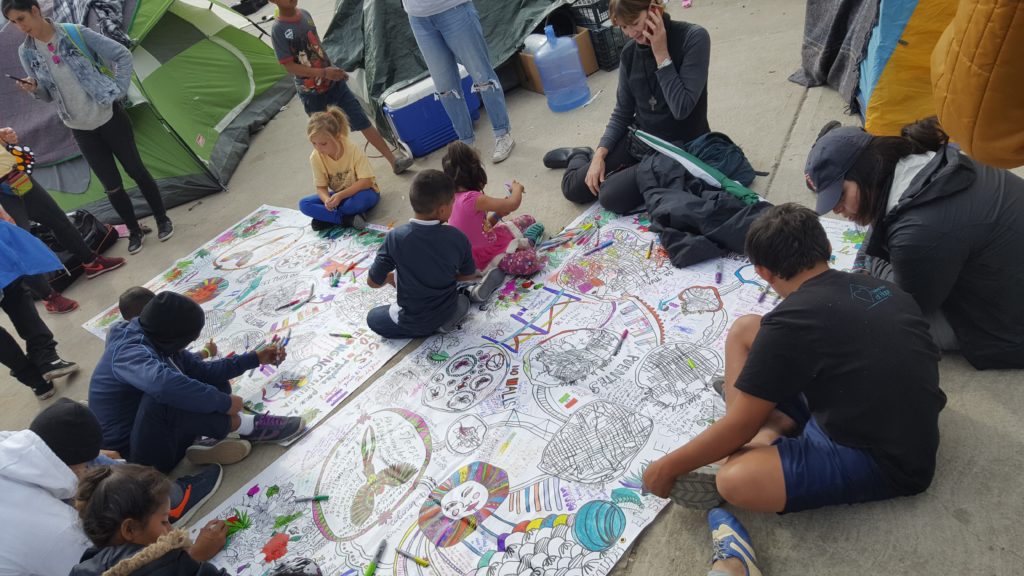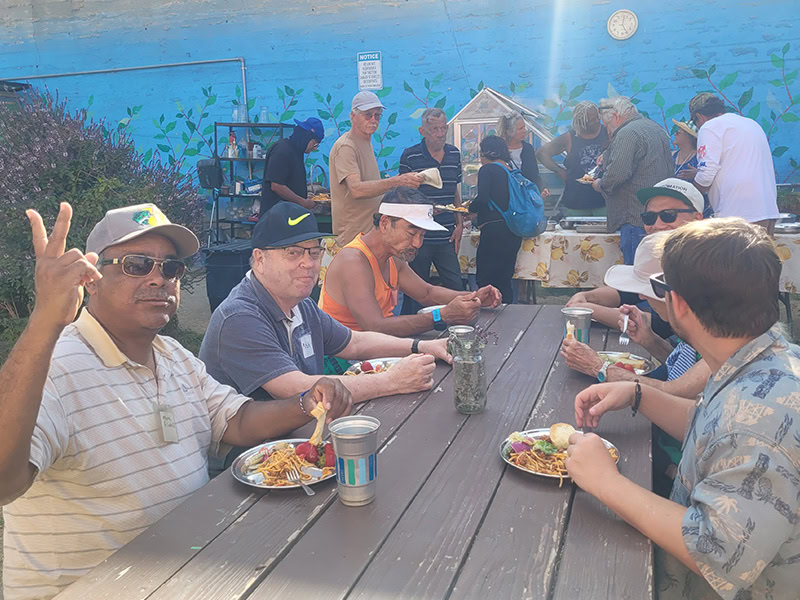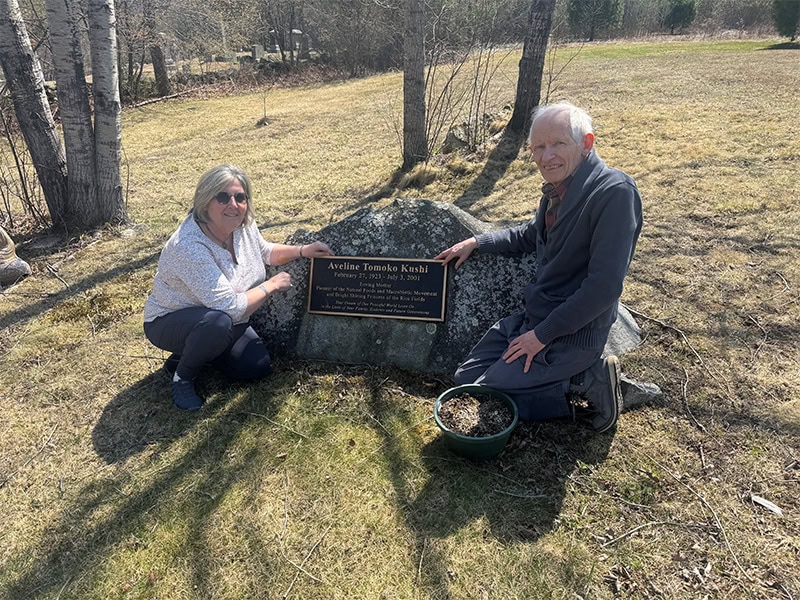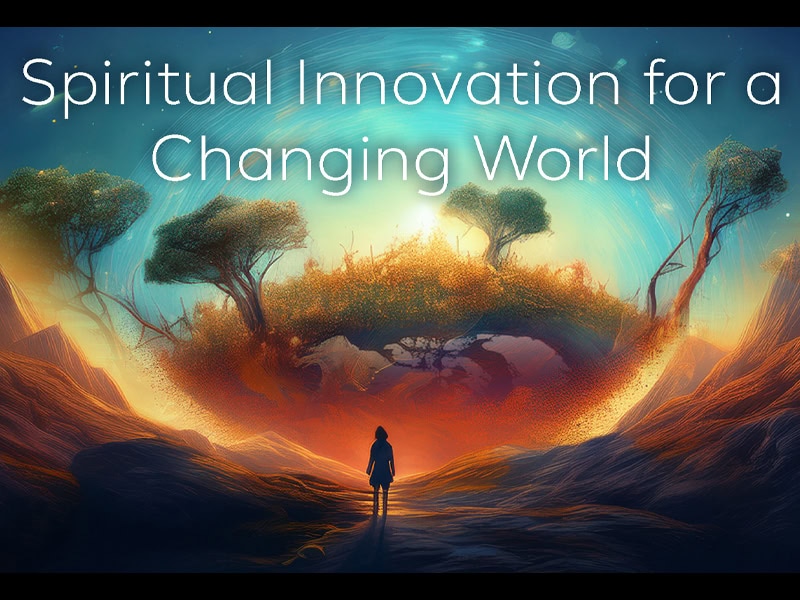Written by Amanda Adams Riley

I purchased my first clerical collar for one reason, and one reason only, to wear it when I went to lobby. Presbyterians don’t often wear clerical collars, just black Geneva gowns, and only during worship, if then. Growing up in the Presbyterian Church, there was never a question in my mind that my faith belonged in the public square as much as it belonged in my church and in my personal devotional time. For more than 200 years, Presbyterians have spoken publicly about what our faith means to us and what it means to us as citizens in this nation. The idea that there is a separation between church and state means to us, that the state cannot and should not regulate our worship, but it does not mean that we take off or separate our faith and beliefs when we enter the public square. We are expected to be faithful to the Gospel on Sunday mornings and the rest of the week as we move through the world as God’s living, breathing gospel in flesh.
Growing up in the time of the “Moral Majority,” thanks to larger than life religious and political figures like Jerry Falwell, Sr. I frequently heard loud voices informing the world what Christians believed. However, what they espoused was not at all what my church taught and preached nor what I understood for myself when reading God’s holy word. If Baptist Christians could be in the streets and in the halls of power bending the ears of elected officials, then why couldn’t I do the same? In high school I learned that my denomination not only had an office in Washington, D.C. called the Office of Public Witness, but we also had an office in New York across from the United Nations. I remember being surprised and pleased to hear that our church was out in the world witnessing to the world what the love of God looks like in action. One of the great ends of the Presbyterian Church is the “Exhibition of the Kingdom of Heaven to the World.” We are called to live out the Gospel in our daily lives, which includes our civic responsibility, and to show what the kingdom of heaven looks like. We are to show this not just to our neighbors or in our own nation, but to the whole world. These offices and ministry are a natural reflection of that calling. The Presbyterian Church witnesses on the global stage through the United Nations offices as well as through the World Council of Churches.
The ministry of public policy of the Presbyterian Church (U.S.A.) is the Presbyterian Office of Public Witness and advocacy office of the General Assembly of the Presbyterian Church (U.S.A.). The purpose, history, and biblical foundation for this work according to the website is the following:
Its task is to advocate, and help the church to advocate, the social witness perspectives and policies of the Presbyterian General Assembly. The church has a long history of applying these biblically and theologically-based insights to issues that affect the public—maintaining a public policy ministry in the nation’s capital since 1946.
Reformed theology teaches that because a sovereign God is at work in all the world, the church and Christian citizens should be concerned about public policy. In addition, Presbyterian forefather John Calvin wrote, “Civil magistery is a calling not only holy and legitimate, but by far the most sacred and honorable in human life.”
Ministry in Washington offers a chance to translate the church’s deep convictions about justice, peace, and freedom from words into reality. The political process is where decisions are made that help or harm people; decisions that help to make the kind of world God intends.
Office of Public Witness staff members visit national policy makers and their staff, write letters, make phone calls, and occasionally testify before Congress or facilitate the testimony of church leaders. This involvement helps to clarify the moral and ethical issues at stake in public policy. The goal is to make clear to people in government what the General Assembly is concerned about, why, and what can be done to respond to those concerns.
By adopting a study entitled, “Why and How the Church Makes a Social Policy Witness,” the 205th General Assembly (1993) emphasized the importance of the church’s social witness policies and programs. Along with affirming that God alone is Lord of the conscience, the study affirms “the responsibility and authority of the church to make a social witness policy which guides that witness. The church, if it is to remain true to its biblical roots, theological heritage, and contemporary practice, must not fall silent. It must speak faithfully, truthfully, persuasively, humbly, boldly and urgently.”
In 1936, the former United Presbyterian Church in the U.S.A. developed the Department of Social Education and Action. Presbyterians have always been known as political advocates; however, this new Department created the first organized national effort. Knowing the value of Washington representation, the Department hired Fern Colborn in 1946 to maintain an office and a secretary on Eleventh Street NW in Washington, D.C. This became the first Presbyterian Washington Office. Since then, the Washington Office has been led by several directors and many dedicated issue staff.
Throughout the Bible, scripture reveals God’s will to do justice. The Hebrew prophets continually remind God’s people “…What does the Lord require of you but to do justice, and to love kindness, and to walk humbly with your God?” (Micah 6:8). The prophets give specific warning to those who seek only their own well-being and ignore the well-being of the marginalized and oppressed. Israel’s failure to be just and righteous is clearly seen as disobedient to God and the reason for national decay and destruction.
Jesus frequently witnessed to the priority of the poor in the reign of God. He challenged the rich young ruler, he sharply criticized the hard-heartedness of religious leaders, and he taught that those who reached out to marginalized persons were serving him (Luke 18:18–25, Matthew 19:16–24 and Luke 10:25–37). In addition, Christ speaks of the accountability of nations to do justice in Matthew 25 and states, “Truly I tell you, just as you did it to one of the least of these who are members of my family, you did it to me.”
Our world can feel like a complicated place sometimes, and it’s not always clear which path is the path that aligns most closely with the Gospel. I have heard followers of Christ advocate for and against war. I heard people of faith argue over issues including abortion and workers’ rights. I have always found great reassurance in the fact that my denomination has and has had clearly articulated, prayerfully reasoned, and theologically grounded statements on issues that arise in our public sphere. These give me something in addition to scripture to turn to when seeking to ground myself in faith.
In 1997, I had the pleasure of attending our church’s national assembly as a youth advisory delegate. In the role of youth advisory delegate, I was given voice and vote in our committee meetings and voice on the floor of the plenary sessions. We took many votes that summer that I still remember to this day. One of the votes that I will not soon forget was around late-term abortions. I remember how charged this vote was, and I remember wondering why anyone outside of our church would care at all what the Presbyterian Church had to say about this issue. When I asked, I was reassured by the commissioners around me that it was indeed the case that politicians in Washington D.C. and elsewhere would pay close attention to the decisions that we made. The reason being, that our denomination represents a portion of the voting public as well as being an ethical and moral compass for the nation. The Presbyterian Church U.S.A. has a long-standing pro-choice history as a denomination. That summer we did vote in-line with our historic standing as a church. And later that year our nation’s congress did not ban the procedure.
In December of 2018, our president at the time was talking extensively about a “caravan” at our southern border. At the same time my Presbytery (geographic region of churches), which has been involved in ministry with immigrants, migrant workers, and refugees for many years, planned a trip down to the border to visit the encampment, provide witness to the larger church about what we witnessed, and offer some art to the children and pastoral support to those waiting for asylum at our border. Rev. Thom Muller joined me at the border for the trip. It was a blessing to see first-hand what had been covered extensively by our media, and what we saw was so much more than the coverage afforded us. The same week I returned, a local religious social justice group called on clergy to convene outside the courthouse in downtown Los Angeles to call for the release of asylum seekers being detained there. Once again, I donned a clerical collar and joined a colleague in the streets to reflect on our faith and what it meant in that day and time.
Each year a group of Christians gather in Washington, D.C. for an annual event called Ecumenical Advocacy Days. In April of 2019, I had the pleasure of attending this event. Nearly 1,000 Catholic and Protestant Christians gathered from around the nation to call with one voice for one particular issue. In 2019, the focus was on immigration and voting rights. We spent a long weekend in lectures and panel discussions and then on Monday headed to Capitol Hill to meet with our own representatives and senators. We met in constituent groups, so I got to connect with people from a variety of Christian traditions, who were taking their faith to our publicly elected officials.
This past month I received a plea from a clergy colleague, the rabbi at the Temple in San Pedro, California to sign a letter in support of calls for a police accountability committee for a local police department. Officers in the department had recently painted swastikas on impounded cars. This was following an officer involved in the shooting death of a young Black man in December 2019, which despite calls from the family, community, and Black Lives Matter–L.A., did not result in any additional oversight for the department. Since the shooting death of Christopher De’Andre Mitchell in 2019, Black Lives Matter (BLM) has been a persistent presence at the city council meetings at the request of the Mitchell family. Due to recent threats of violence against BLM activists, in addition to the anti-Semitic vandalism of vehicles, clergy presence was requested at the meeting. I am the executive presbyter for my Presbytery and was present for the meeting to bear witness with our siblings in Christ as they called for accountability of the police department.
If the idea of carrying your faith out into the public square appeals to you, join us to learn more about what that looks like. Starting in January, the SJC invites you to a series of online Zoom events titled “Spirit in Action: Civic Engagement and Religious Life.”
Meet Rev. Dr. Amanda Adams Riley
Rev. Dr. Amanda Adams Riley is co-chair of the Social Justice Committee and co-pastor of The Garden Church in San Pedro, California.



